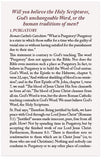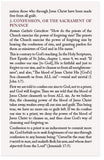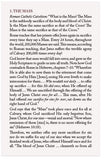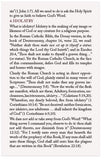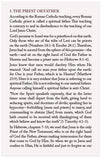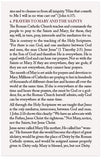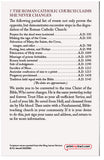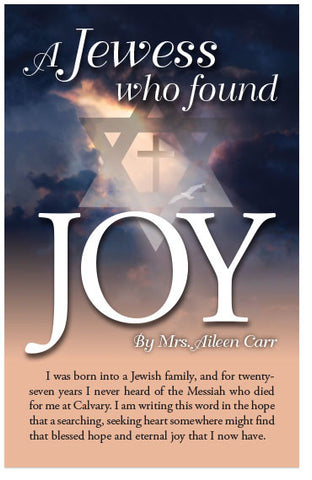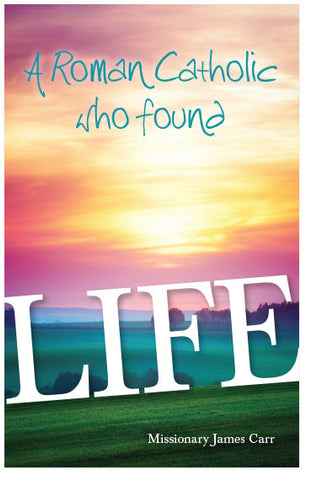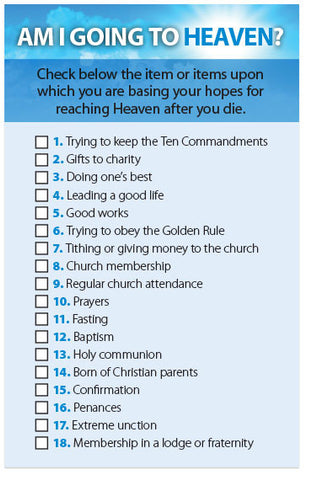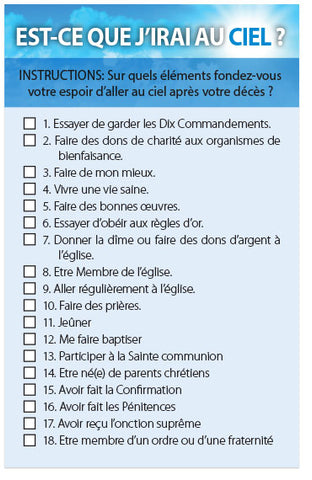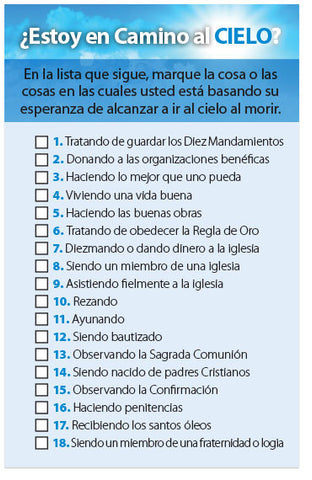Which Will You Believe? (KJV)
Special-Order Folded Tract
 NOTE: This item is custom-printed to order (click for more details).
NOTE: This item is custom-printed to order (click for more details).
This tract is from our print-on-demand library, and is not kept in stock. Select the options below, and we will custom-print a batch just for you. Because this item is custom-printed, you can add your custom imprint to the back page at no extra cost.
- Estimated shipping date: Thursday, March 26 (Click for more details)
- SKU:
- Discounts: Discount coupons do not apply to this item
- Format: Folded Tract
- Size: 3.5 inches x 5.5 inches
- Pages: 8
- Imprinting: Available with 5 lines of custom text
- Version: KJV
- Returns: Because this item is custom-printed to order, it cannot be returned.
Show all item details
The full text of this tract is shown below in the KJV version. (Do you want to print this tract in a different version than the one listed? Contact us and let us know what you're looking for—we may be able to create the alternate version for you at no charge.)
Will you believe the Holy Scriptures, God’s unchangeable Word, or the human traditions of men?
1. PURGATORY
Roman Catholic Catechism: “What is Purgatory? Purgatory is a state in which those suffer for a time who die guilty of venial sins or without having satisfied for the punishment due to their sins.”
This statement is contrary to God’s teaching. The word “Purgatory” does not appear in the Bible. Nor does the Bible even mention such a place as Purgatory. In fact, to believe in Purgatory is to hold the Word of God untrue. God’s Word, in the Epistle to the Hebrews, chapter 9, verse 22, says, “And without shedding of blood is no remission”; and in the First Epistle of St. John, chapter 1, verse 7, we read: “The blood of Jesus Christ His Son cleanseth us from all sin.” The blood of Jesus Christ cleanses from all sin. God’s Word is true, but the above Roman Catholic teaching contradicts God’s Word. We must believe God’s Word, the Holy Scriptures.
St. Paul says, “Therefore Being justified by faith, we have peace with God through our Lord Jesus Christ” (Romans 5:1). “Justified” means made innocent, pure, free from all guilt. How? Not by spending time in Purgatory, but by accepting the finished work of our Lord Jesus Christ. Furthermore, Romans 8:1: “There is therefore now no condemnation to them which are in Christ Jesus” (or, to those who are real Christians). Nothing and nobody can condemn to Purgatory or to any other place of condemnation those who through Jesus Christ have been made free from all guilt.
2. CONFESSION, OR THE SACRAMENT OF PENANCE
Roman Catholic Catechism: “How do the priests of the Church exercise the power of forgiving sins? The priests of the Church exercise the power of forgiving sins by hearing the confession of sins, and granting pardon for them as ministers of God and in His name.”
This is contrary to God’s teaching. In the Holy Scriptures, First Epistle of St. John, chapter 1, verse 9, we read: “If we confess our sins [to God], He is faithful and just to forgive us our sins, and to cleanse us from all unrighteousness”; and also, “The blood of Jesus Christ His [God’s] Son cleanseth us from ALL sin”—venial and mortal (1 John 1:7).
First we are told to confess our sins to God, not to a priest, and God will forgive. Then we are told that the blood of Jesus Christ cleanseth us from ALL sin. As we believe this, the cleansing power of the blood of Jesus Christ takes away, washes away all our sins and guilt. This being true, we have no more sin or guilt left. If we do confess our sins to a priest, we deny the power of the blood of Jesus Christ to cleanse us, and thus close God’s way of cleansing and forgiving us.
Confession to a priest is an inducement to commit more sin. God forbids us to seek forgiveness of our sins through confession to any human being: “Cursed be the man that trusteth in man, and maketh flesh his arm, and whose heart departeth from the Lord” (Jeremiah 17:5).
3. THE MASS
Roman Catholic Catechism: “What is the Mass? The Mass is the unbloody sacrifice of the body and blood of Christ. Is the Mass the same sacrifice as that of the Cross? The Mass is the same sacrifice as that of the Cross.”
Rome teaches that her priests offer Jesus again in sacrifice every time they say a Mass. Every 24 hours, throughout the world, 200,000 Masses are said. This means, according to Roman teaching, that Jesus suffers the terrible agony of Calvary 200,000 times every day!
God knew that men would fall into error, and gave us the Holy Scriptures to guide us into all truth. Note how God contradicts Rome in Hebrews, chapters 7-10. “Wherefore He is able also to save them to the uttermost that come unto God by Him [Jesus], seeing He ever liveth to make intercession for them…. Who needeth not daily … to offer up sacrifice … for this He did once, when He offered up Himself…. We are sanctified through the offering of the body of Jesus Christ once for all…. This man, after He had offered one sacrifice for sins for ever, sat down on the right hand of God.”
God says that the “Mass” took place once and for all at Calvary, where God sacrificed His only begotten Son, Jesus Christ, for our sins—venial and mortal. “Now where remission of these [sins] is, there is no more offering for sin” (Hebrews 10:18).
Therefore, we neither offer any more sacrifices for sin nor do we suffer for any of our sins when we accept the finished work of Jesus, who offered Himself once and for all. “The blood of Jesus Christ … cleanseth us from all sin” (1 John 1:7). All we need to do is ask the Holy Spirit to give us faith to believe God’s Word.
4. IDOLATRY
What is idolatry? Idolatry is the making of any image or likeness of God or any creature for a religious purpose.
In the Roman Catholic Bible, the Douay version, in the book of Deuteronomy, chapter 16, verse 22, we read: “Neither shalt thou make nor set up to thyself a statue: which things the Lord thy God hateth”; and in Exodus 20:4, “Thou shalt not make to thyself a graven thing…” (or statue). Yet the Roman Catholic Church, in the face of this commandment, defies God and fills its temples and homes with images.
Clearly the Roman Church is acting in direct opposition to the will of God, plainly stated in many verses of Scriptures: “Thou shalt not make thee any graven image…” (Deuteronomy 5:8). “Now the works of the flesh are manifest, which are these; Adultery, fornication, uncleanness, lasciviousness, idolatry… ” (Galatians 5:19,20). “Wherefore, my dearly beloved, flee from idolatry” (1 Corinthians 10:14). “Be not deceived: neither fornicators, nor idolators, nor adulterers … shall inherit the kingdom of God” (1 Corinthians 6:9,10).
We dare not add or take away from God’s Word! “What thing soever I command you, observe to do it: thou shalt not add thereto, nor diminish from it” (Deuteronomy 12:32). “For I testify unto every man that heareth the words of the prophecy of this Book, If any man shall add unto these things, God shall add unto him the plagues that are written in this Book” (Revelation 22:18).
5. THE PRIEST OR FATHER
According to the Roman Catholic teaching, every Roman Catholic priest is called a spiritual father. This teaching is contrary to and in disobedience to the teaching of our Lord Jesus Christ.
God’s promise to Israel was for a priesthood on this earth. Only those who are of the tribe of Levi can be priests on the earth (Numbers 18:1-8; Exodus 28:1). Therefore, Jesus had to ascend from the sphere of this promise—the earth—and sit on the right hand of God the Father in Heaven and become a priest unto us (Hebrews 8:1-4).
Jesus knew that men would disobey Him when He warned: “And call no man your father upon the earth: for One is your Father, which is in Heaven” (Matthew 23:9). Here it is very evident that Jesus is referring to our spiritual Father; He is not referring to our natural fathers. Anyone calling himself a spiritual father is anti-Christ.
“Now the Spirit speaketh expressly, that in the latter times some shall depart from the faith, giving heed to seducing spirits, and doctrines of devils; speaking lies in hypocrisy—forbidding [nuns and priests] to marry, and commanding to abstain [fast] from meats, which God hath created to be received with thanksgiving of them which believe and know the truth” (1 Timothy 4:1-3).
In Hebrews, chapters 7-10, we read that Jesus is the only Priest of the New Testament, who is on the right hand of God the Father, always making intercession for them that come to God by Him. So when we go to Jesus and confess to Him, He is faithful and just to forgive us our sins and to cleanse us from all iniquity. “Him that cometh to Me I will in no wise cast out” (John 6:37).
6. PRAYERS TO MARY AND THE SAINTS
The Roman Catholic Church teaches and commands the people to pray to the Saints and Mary; for these, they say, will, in turn, pray, intercede and be mediators for us.
This is contrary to the teaching of the Holy Scriptures. “For there is one God, and one mediator between God and men, the man Christ Jesus” (1 Timothy 2:5). Jesus is the Son of God and therefore He is everywhere. He is equal with God and can hear our prayers. Not so with the Saints or Mary. If they are everywhere, they are gods; if they are not everywhere, they cannot hear prayers.
The month of May is set aside for prayers and devotion to Mary. Millions of Catholics are praying to her in hundreds of thousands of different churches and homes all over the world at the same time. If she is everywhere at the same time and hears those prayers, she must be God or a goddess; for, as the Roman Church herself admits, only God can be everywhere at the same time.
All through the Holy Scriptures we are taught that Jesus is the only mediator, intercessor, between God and man.
1 John 2:1b shows this clearly: “We have an advocate with the Father, Jesus Christ the righteous.” Not Mary, notice, not the Saints, but Jesus Christ.
Jesus never called Mary His mother; He called her “woman.” He foresaw that she would become the object of great idolatry, would be given the place of Deity by the Roman Catholic system, and would be assigned names properly given to Deity only. Mary is blessed, yes, but not Deity.
7. THE ROMAN CATHOLIC CHURCH CLAIMS SHE NEVER CHANGES
The following partial list of events not only proves the opposite, but demonstrates successive steps in the degradation of the Roman Catholic Church:
Prayers for the dead were instituted A.D. 330
Making the sign of the Cross A.D. 330
Adoration of Mary, the Saints, the Cross, images, and relics A.D. 788
Fasting, lent, advent, and Fridays A.D. 998
Fabrication of Holy water A.D. 1009
Marriage of priests forbidden A.D. 1079
Rosary beads invented A.D. 1090
Sale of indulgences A.D. 1190
Sacrifice of Mass A.D. 1215
Auricular confession of sins to a priest A.D. 1215
Purgatory proclaimed A.D. 1438
Tradition held equal with the Bible A.D. 1545
(The dates are approximate.)
We invite you to be converted to the true Christ of the Bible, Who never changes. He is the same yesterday, today and forever. Trust Him as your all-sufficient Savior, and Lord of your life. Be saved from Hell, and cleansed from sin by His blood. Then unite with a Fundamental, Bible-teaching church in your community. If it is your desire to do this, just sign your name and address, and return to us for more information.



